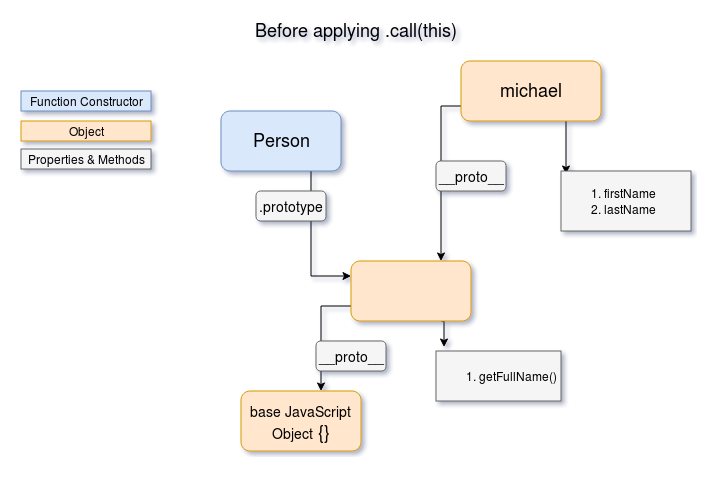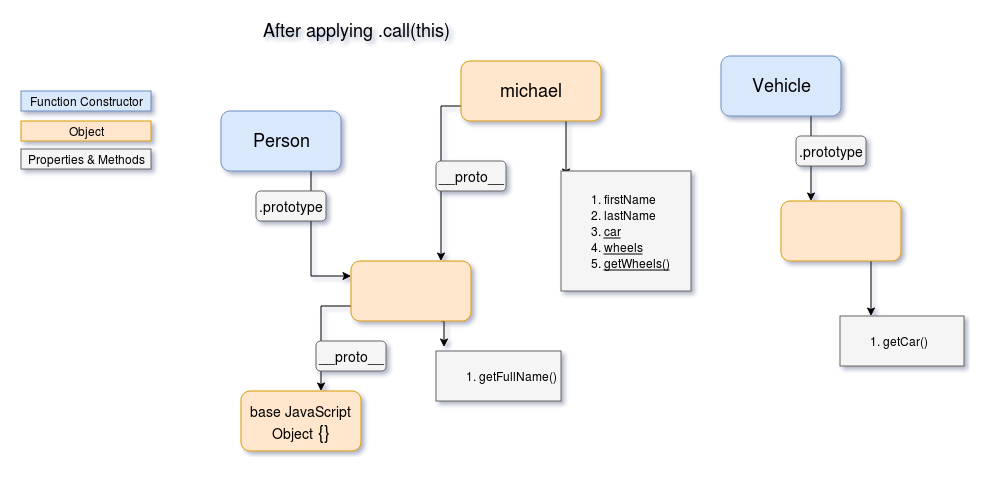Reading Nodejs source code - Using fn.call to inherit properties and methods from other constructor functions?
Using util.inherits Readable object gets access to all the properties and methods defined on the prototype property of ‘Stream’ function constructor.
Node.js source code (lib -> _stream_readable.js)
function Readable(options) {
.
.
.
.
Stream.call(this);
}
How does .call(this affect the above code?
I wrote the following code to understand the point of using .call(this)
function Person() {
this.firstName = "John";
this.lastName = "Doe";
}
Person.prototype.getFullName = function() {
return this.firstName + " " + this.lastName;
}
var michael = new Person();
console.log(michael);
console.log(michael.__proto__);
console.log(michael.__proto__.__proto__);
console.log(michael.__proto__.__proto__.__proto__);
Output
Person { firstName: 'John', lastName: 'Doe' }
Person { getFullName: [Function] }
{}
null
Using .call(this)
function Person() {
this.firstName = "John";
this.lastName = "Doe";
Vehicle.call(this);
}
Person.prototype.getFullName = function() {
return this.firstName + " " + this.lastName;
}
function Vehicle() {
this.car = "Honda";
this.wheels = 4;
this.getWheels = function() {
return this.wheels;
}
}
Vehicle.prototype.getCar = function() {
return this.car;
}
var michael = new Person();
console.log(michael);
// Prototypal Chain for 'michael'
console.log("\n Prototypal Chain for 'michael'");
console.log(michael.__proto__);
console.log(michael.__proto__.__proto__);
console.log(michael.__proto__.__proto__.__proto__);
Output
Person {
firstName: 'John',
lastName: 'Doe',
car: 'Honda',
wheels: 4,
getWheels: [Function] }
Prototypal Chain for 'michael'
Person { getFullName: [Function] }
{}
null


We use .call to modify the value of what this points to when calling a function. Vehicle.call(this) calls the ‘Vehicle’ function constructor with the object ‘michael’ in this case.
Inside the ‘Vehicle’ function since this now points to ‘michael’ object, as the commands this.car = "Honda" and this.wheels = 4 are executed, these properties are added to the ‘michael’ object, as we can see from the output.
Using .call(this) does not affect the prototypal chain. It only adds properties and methods from the Function constructor which was called. It does not add properties or methods which are on the ‘prototype’ property of the function constructor. For instance ‘michael’ object has the properties ‘car’ and ‘wheels’ but not the method ‘getCar’ which is defined on the prototype property of ‘Vehicle’ function constructor.
If in the above code, we try to call ‘getCar’ on ‘michael’ object
console.log(typeof michael.getCar);
console.log(michael.getCar());
We get an error
Output
undefined
TypeError: michael.getCar is not a function
If however we call ‘getWheels’ on the ‘michael’ object it executes as it was defined within the ‘Vehicle’ function constructor and so was added to ‘michael’ object when Vehicle.call(this) was executed
console.log(typeof michael.getWheels);
console.log(michael.getWheels());
Output
function
4
Summary
.call(this)
-
Gives access to methods and properties defined inside the function constructor
-
Does not affect the prototypal chain
-
Does not borrow properties and methods defined on the prototype property of the function constructor